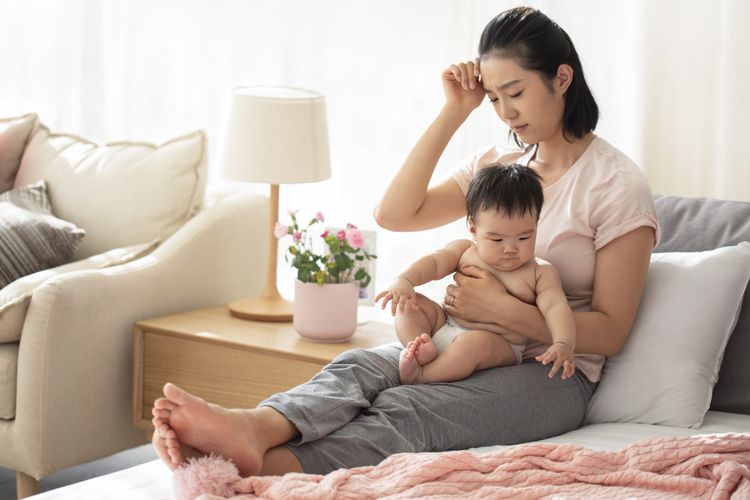What are the symptoms of postpartum anxiety?
Postpartum anxiety is a condition characterized by excessive worry, fear, or nervousness following childbirth. It can affect a new mother’s ability to function and enjoy her life. Symptoms of postpartum anxiety may include:
- Excessive Worry: Persistent and overwhelming worry about the baby’s health, safety, and well-being, or about one’s own abilities as a parent.
- Restlessness: Feeling on edge, irritable, or unable to relax.
- Racing Thoughts: Inability to stop thinking about various concerns, often jumping from one worry to another.
- Physical Symptoms: Manifestations such as a racing heart, shortness of breath, dizziness, excessive sweating, trembling, or gastrointestinal issues like nausea or diarrhea.
- Sleep Disturbances: Difficulty falling asleep or staying asleep, even when the baby is sleeping. This can also include insomnia caused by worrying thoughts.
- Fatigue: Constant tiredness, which can result from both anxiety and disrupted sleep patterns.
- Difficulty Concentrating: Trouble focusing, making decisions, or remembering things.
- Irritability or Anger: Increased sensitivity to minor annoyances, leading to irritability or frustration.
- Avoidance Behaviors: Avoiding certain activities, places, or situations that trigger anxiety, such as leaving the house or being separated from the baby.
- Physical Tension: Muscle tension or muscle stiffness, often in the neck, shoulders, or back.
- Fear of Being Alone with the Baby: Concerns about not being able to handle situations or fears of something bad happening when alone with the baby.
Postpartum anxiety can be distressing and challenging to manage. If these symptoms are interfering with daily life or causing significant distress, it’s important to seek help from a healthcare provider, counselor, or mental health professional. Treatment can include therapy, support groups, lifestyle changes, and, in some cases, medication.
What are the causes of postpartum anxiety?
Postpartum anxiety can arise from a combination of physical, emotional, and environmental factors. Key causes include:
- Hormonal Changes: After childbirth, levels of hormones such as estrogen and progesterone drop significantly, which can affect mood and contribute to anxiety.
- Sleep Deprivation: The demands of caring for a newborn often result in disrupted sleep and fatigue, which can exacerbate feelings of anxiety.
- Previous Mental Health History: A history of anxiety, depression, or other mental health conditions increases the risk of developing postpartum anxiety.
- Stress and Life Changes: The transition to parenthood brings significant changes and stressors, including new responsibilities, changes in routine, and concerns about parenting abilities.
- Personal or Family History: A personal or family history of anxiety disorders or other mental health issues can increase susceptibility to postpartum anxiety.
- Physical Recovery: The physical recovery from childbirth, including any complications, pain, or discomfort, can contribute to stress and anxiety.
- Breastfeeding Challenges: Difficulties with breastfeeding, such as issues with milk supply, pain, or concerns about the baby’s nutrition, can be a source of anxiety.
- Lack of Support: Feeling unsupported by a partner, family, or friends, or lacking a support network, can increase feelings of isolation and anxiety.
- Financial Concerns: Worries about finances, job security, or the cost of raising a child can contribute to anxiety.
- Baby’s Health: Concerns about the baby’s health, development, or any medical issues can be a significant source of worry.
- Perfectionism and High Expectations: Some new mothers may set unrealistic expectations for themselves, leading to anxiety if they feel they are not meeting those expectations.
Postpartum anxiety can be a complex condition influenced by a range of factors. It’s important for new mothers experiencing symptoms to seek support from healthcare professionals, as early intervention can help manage and alleviate anxiety.
What is the treatment for postpartum anxiety?
The treatment for postpartum anxiety typically involves a combination of therapies and interventions tailored to the individual’s needs. Effective treatment options include:
- Cognitive-Behavioral Therapy (CBT): CBT is a common and effective form of therapy that helps individuals identify and change negative thought patterns and behaviors associated with anxiety. It can help new mothers develop coping strategies and manage anxiety symptoms.
- Counseling and Talk Therapy: Speaking with a therapist, counselor, or psychologist can provide emotional support and guidance. This therapy can address specific concerns related to motherhood, anxiety, and personal challenges.
- Medication: In some cases, medication may be prescribed to help manage symptoms of postpartum anxiety. This can include antidepressants, anti-anxiety medications, or other medications deemed appropriate by a healthcare provider. Medications should be discussed with a doctor, especially concerning breastfeeding.
- Support Groups: Joining a support group for new mothers experiencing postpartum anxiety can provide a sense of community and shared understanding. It allows participants to share experiences, coping strategies, and support.
- Stress-Reduction Techniques: Techniques such as mindfulness meditation, deep breathing exercises, yoga, and progressive muscle relaxation can help reduce stress and anxiety.
- Lifestyle Adjustments: Making healthy lifestyle changes, such as maintaining a balanced diet, getting regular exercise, and ensuring adequate rest, can positively impact anxiety levels.
- Practical Support: Practical support from family, friends, or professional services can help alleviate the stress of daily tasks and childcare. This support can give the mother time to rest, relax, and focus on self-care.
- Self-Care: Encouraging self-care activities, such as hobbies, relaxation techniques, and time for oneself, is important in managing anxiety and promoting overall well-being.
- Education and Information: Learning more about postpartum anxiety, its causes, and treatment options can help new mothers understand their experiences and feel more empowered in managing their symptoms.
It’s important for new mothers experiencing postpartum anxiety to reach out for help from healthcare providers, mental health professionals, or support networks. Early intervention and appropriate treatment can significantly improve quality of life and help manage anxiety symptoms effectively.

Leave a Reply
You must be logged in to post a comment.